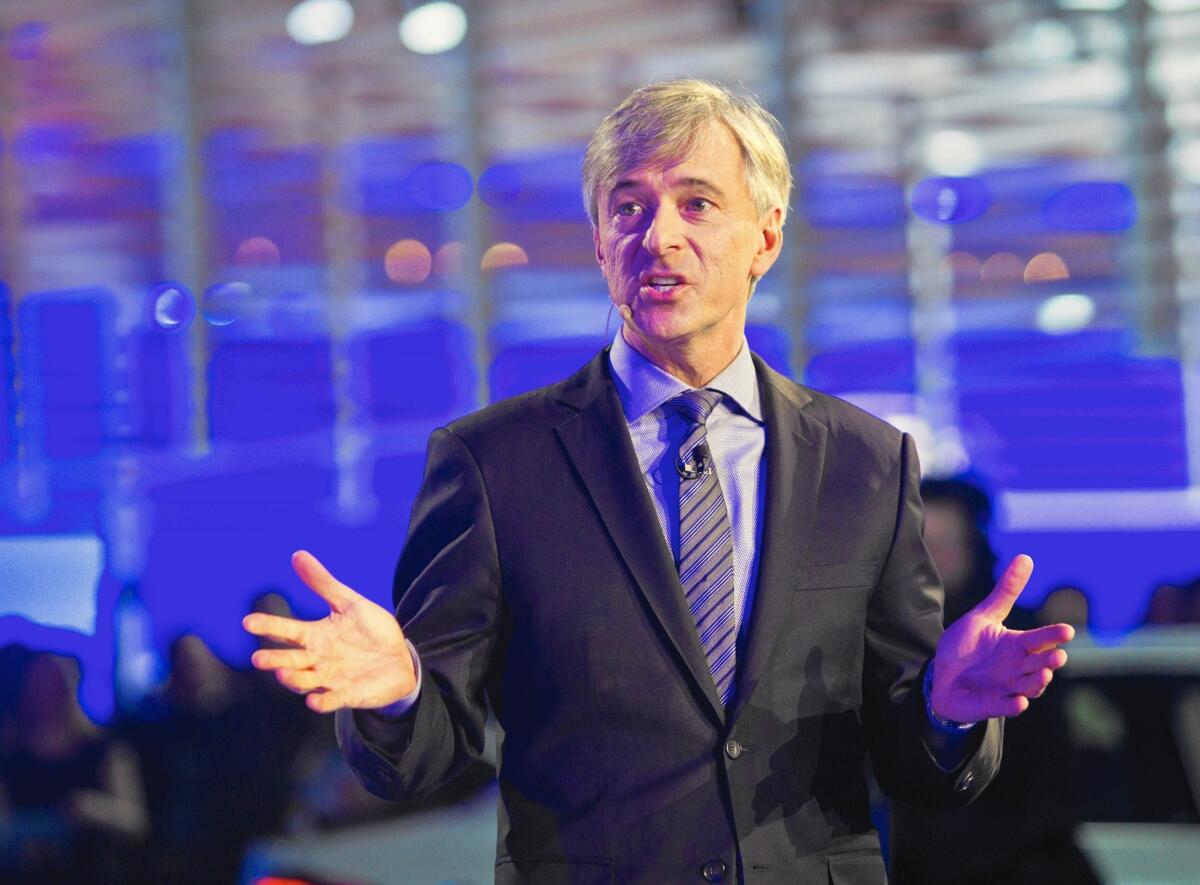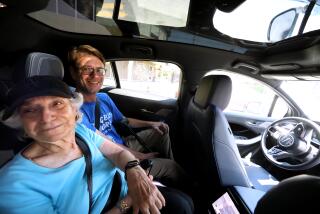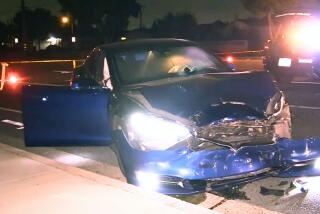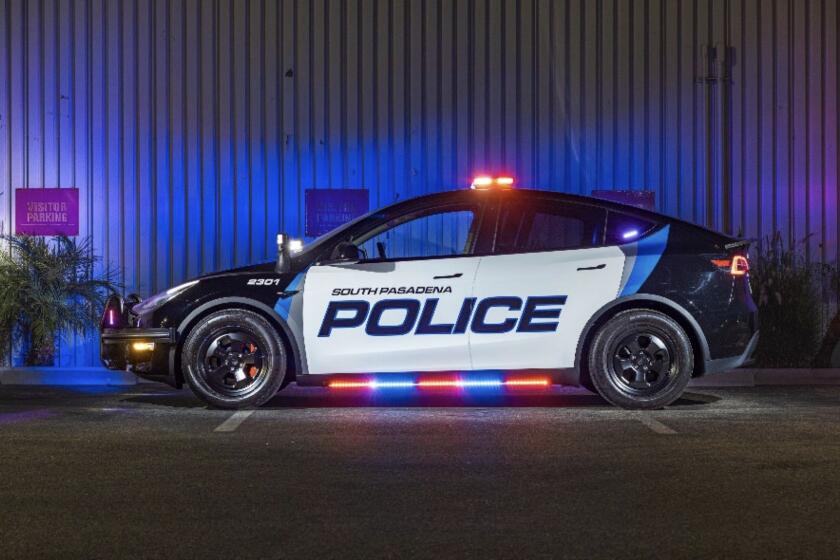Google turbocharges its driverless car initiative with new hire

Google has shifted its driverless-car ambitions into high gear.
The technology giant Monday announced the hiring of auto industry veteran John Krafcik as chief executive of its self-driving car division.
The hiring of the former Ford, Hyundai and TrueCar executive signals an acceleration of Google’s nascent autonomous vehicle division, and may presage the Silicon Valley company’s intentions to enter the high-stakes automotive industry.
Tech giants such as Google and Apple — which also has launched an automotive project — may be among the only companies with enough cash and talent to pose a serious threat to major automakers.
Automotive industry analysts cheered Google’s acquisition of the well-respected executive and Stanford- and MIT-educated engineer. The hiring provides the first evidence that Google has committed to making money in the auto industry, said Kelley Blue Book analyst Karl Brauer.
“This is huge,” he said. “They have hired a highly visible, highly charismatic and experienced veteran of the auto industry with an appreciation for technology, manufacturing and forward-thinking.”
NEWSLETTER: Get the day’s top headlines from Times Editor Davan Maharaj >>
With the hire, said Dave Sullivan, product analyst for AutoPacific Inc., Google gets an executive who represents “the best of Detroit iron, California car culture and Silicon Valley. Krafcik has the connections and manufacturing experience to help Google form the right partnerships to make a self-driving car reality.”
Google said bringing Krafcik aboard demonstrates its commitment to “transforming mobility for millions of people.”
“We’re investing in building out a team that can help us bring this technology to its full potential in the coming years,” said company spokeswoman Kara Berman.
But the company stopped short of declaring a plan to build vehicles — for now, at least.
“We’re not going to manufacture cars,” Berman said. “We’re a long way from the sort of scale operation that we’d need to really bring self-driving cars to consumers in a meaningful way.”
Google has long flirted with the idea of entering the transportation business. The company reportedly tried to acquire its Silicon Valley automotive neighbor, the electric car start-up Tesla Motors — an effort spurned by Tesla co-founder Elon Musk.
More recently, Google has fielded a fleet of prototype driverless cars. Lozenge-shaped self-driving Google cars have been spotted on Bay Area streets, as have self-driving, Google-powered Lexus sedans in the Austin, Texas, area.
Some of those vehicles have run into trouble after getting into collisions with cars driven by human operators. The company said the human operators — not defective self-driving cars — were responsible for at least six accidents.
Apple has also created a team of employees to explore an Apple-branded electric car. The company has made no official announcements, but hints of its intentions surfaced in a lawsuit filed against Apple this year by electric car battery maker A123 Systems.
The company, which makes batteries for BMW, Daimler and Tata, accused Apple of poaching its employees.
The sheer size and economy heft of the two technology giants could make an automotive play possible. Google generates more than $20 billion in cash annually from operations and had nearly $70 billion in cash and marketable securities stockpiled as of June 30. At the time, Apple held nearly $202 billion in similar types of assets.
“They have so much money and so much cash sitting on the balance sheet, that it’s not a problem to get into the car industry themselves,” said Stephen Taylor, managing director at tech advisory firm the Palo Alto Consulting Group.
Apple, if it enters the business, is likely to sell cars itself, Taylor said. With the iPhone, iPad and other products, Apple has sought a top-of-the-line image, even if that means coming to market later than competitors.
“Apple would definitely have that ambition, to build the best car on the planet,” Taylor said.
But Taylor doesn’t see Google trying to become a mass-market car manufacturer. The company’s more likely play would be charging vehicle makers for the software that controls self-driving features.
“They want to provide the substance of the experience, not the substance of the brand,” said Gene Munster, a stock analyst at Piper Jaffray.
For example, Google’s Android operating system, used in many popular smartphones, tablets and smartwatches, is licensed for free by manufacturers such as Samsung Electronics and HTC Corp. Google generates revenue from advertising and app sales on the devices.
The strategy has helped Android become the world’s most-used mobile operating system and, along with YouTube, could account for 15% of the company’s revenue this fiscal year, analysts estimate.
A similar self-driving car licensing ploy could take many routes. Munster said he expects the company to initially work with two partners — a top-tier brand such as Mercedes-Benz or BMW, and ride-hailing service Uber, which is working to develop self-driving taxis and has already received funding from Google.
Krafcik spent more than two decades in the traditional car business before joining online car buying service TrueCar as a board member 18 months ago; he became president a month later. In joining Google, he stressed the safety value of developing cars that will one day drive better robotically than with purely human input.
“This technology can save thousands of lives, give millions of people greater mobility, and free us from a lot of the things we find frustrating about driving today,” Krafcik said in a statement.
Experts were divided on the question of whether Google might enter the capital-intensive business of manufacturing cars, or would license its self-driving technology to an existing car company, or would partner with an automotive giant to produce self-driving vehicles.
The Krafcik hire could signal one or all of the above, Brauer said.
“Krafcik could take them in the pathway of building their own cars, but they would have hired a more traditional executive if they wanted to do that,” he said. “They have hired someone who can arrange all the partnerships they need to outsource their production needs.”
It is significant, said technology strategist Rob Enderle, that Krafcik is not a tech exec — though he has spent time in Silicon Valley.
After his Stanford education, the future CEO worked at the New United Motor Manufacturing Inc. plant in Fremont, Calif., a joint-venture plant operated by Toyota and GM and now occupied by Tesla.
“A tech CEO running the effort would have been redundant,” Enderle said. “What they lack is automotive knowledge — the regulation, the distribution, the manufacturing. He’s the entire package.”
Krafcik’s exit from TrueCar represents a loss for the company, which has weathered a difficult season.
In July, the company’s stock dropped sharply after an announcement that revenue would fail to meet projections, and that sales for the rest of the year would be lower than expected.
Reporting a second-quarter loss of $15 million and calling the numbers “an important wake-up call,” company Chief Executive and co-founder Scott Painter later announced his intention to step down by the end of the year.
The loss of Krafcik, who probably would have been considered the top candidate for Painter’s job, means TrueCar is now seeking a president and CEO.
ALSO
Hackers can now hitch a ride on car computers
Porsche unveils all-electric Tesla-fighting sports car
California’s tech ties to India are about to get a boost








